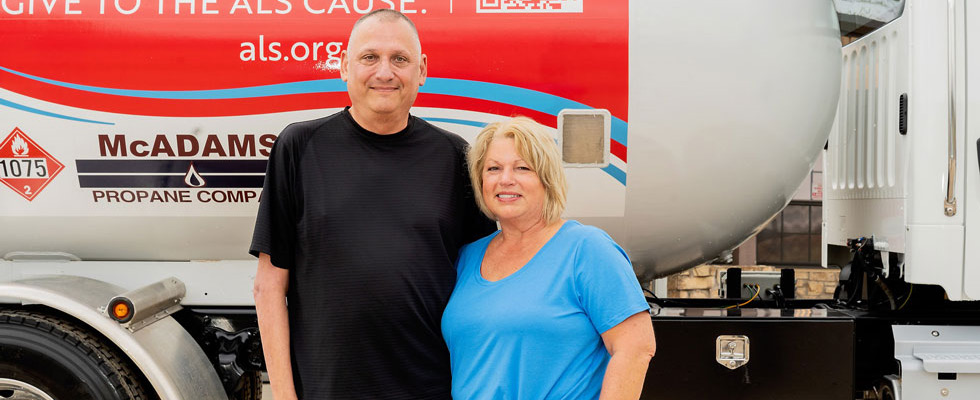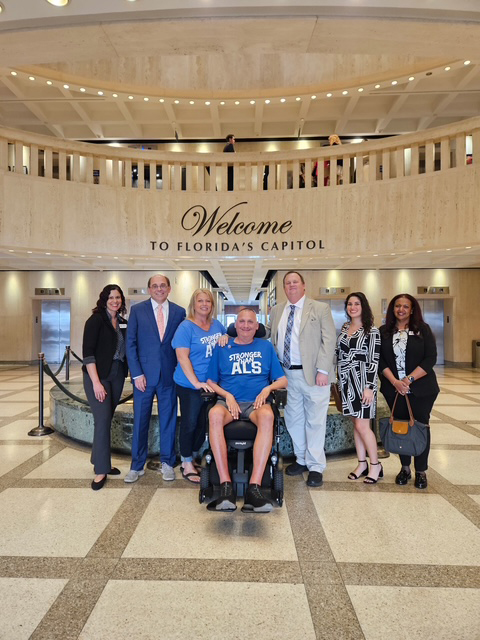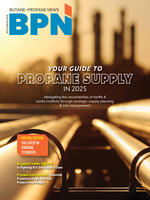
Earlier this year, I was given the opportunity to speak with Bergquist’s customer success manager, Mike Vigliotti. About 10 years ago, Mike was diagnosed with amyotrophic lateral sclerosis (ALS) — also known as Lou Gehrig’s disease. ALS is a neurological disease that targets nerve cells, impacting the body’s ability to control its movements and leading to loss of muscle control. Today, Bergquist supports employee Mike Vigliotti ALS journey by standing alongside him with compassion and resources.
Since his diagnosis, Mike has dived headfirst into the ALS community, participating in fundraising events, connecting with others who share his diagnosis and opening doors for people to join him as he seeks to support resources for those who might find themselves in his shoes.
In our interview, Mike shared some of the challenges he faces living with ALS and the love and support he has found in family, friends and the propane industry.
Bergquist Supports Employee Mike Vigliotti ALS Journey Through Strength, Care & Community
Johnny: When did you receive the ALS diagnosis, and how has your daily life been impacted since then?
Mike: The ALS diagnosis part gets a little bit tricky, because I was misdiagnosed. It took a couple of years of doctor appointments and different specialists before I really officially got the diagnosis. It was actually 10 years ago in May that I first saw a doctor and I knew something wasn’t right. My case is a little bit unique with ALS. The average lifespan is only two to five years from the time of diagnosis. I’m in year 10, and I think it’s less than 5% of the cases go 10 years or more. So, I’m incredibly lucky.
But today … it’s impacted not only my life, but my wife, Kris’s, life and family and friends. I have no use of my right hand and arm. I have barely any use of my left hand. I can walk some; my balance is really bad, and when I do walk, I get worn out. The legs get tired very easily, so I spend a good amount of time in a power wheelchair these days. And it affects every aspect of your life. I mean, I used to be super active.
My wife works for Bergquist, as well, and they’ve been unbelievably amazing and awesome working with me through this. But [my wife will] get up at least an hour and a half or so [earlier than me] so she can get herself ready, and then she needs to help me out of bed. She needs to bathe me, you know, all personal grooming — shave me, brush my teeth, shower and then feed me most of the time. … It’s a huge stress on the caregivers, probably as much as it is on me. Breathing function has gotten bad. ALS affects every muscle in your body. Eventually you lose the ability to talk, to eat, swallow and then ultimately breathe. And that’s usually what you die of, respiratory failure.
Today, my lung function is only 42% of its capacity, so I can’t lie down flat and I can’t breathe. I have to use a noninvasive ventilator when I sleep at night, and then usually for a couple of hours during the day to be able to breathe. It’s definitely been a huge impact for sure.
Johnny: I can only imagine. It’s really difficult to go from being capable of doing things somewhat independently to then depending on loved ones and family. … And I’m sure it’s things that you probably didn’t even really think of, or just things that you don’t think about until they happen.
Mike: Yeah, you don’t ever plan for an event like this.
Johnny: You had mentioned working at Bergquist. I didn’t know that your wife works with Bergquist as well. You said that it’s been a really great experience working with them. Are there any memories or moments that come to your mind that are particularly supportive?
Mike: Yeah, definitely. Since they learned that I had ALS, they’ve been incredibly supportive. They’ve made it a corporate initiative to support not only us, but everybody living with ALS. For me personally, I use an eye-tracking device for my laptop. I have a hard time using the computer mouse, so it allows me to use my eyes to control my computer. [Bergquist covers] the cost of all of that. They also include talk-to-tech software from my laptop — just anything that would make my life easier.
They donated and sponsored numerous ALS events back in the fall. Lauren Clark, our CEO, came down here to Florida from Michigan and raised money and awareness. It was kind of a similar event to the old ice bucket challenge, if you might remember that trend from 10 years ago or so, where people were pouring buckets of ice water over their heads. They came down to Florida to do that — [Lauren] and her husband were just awesome. At our open house last year … we had the ALS association there with the tent set up, and we set up a dunk tank to raise money. It was really an amazing day.
Johnny: That’s awesome. It’s special to find a company with that level of personal care for their employees and for their people. Do you have any thoughts or advice for companies looking for ways to make the workplace more accommodating, for not only people with ALS, but similar health conditions that severely impact daily life?
Mike: For any employer out there, not even just for ALS but for any health condition, the amount of stress that puts on not only myself, but [my] entire family is huge, which can only make your condition even worse. And if companies can only find a way to somehow accommodate people that are going through something like this, to keep them working as long as they possibly can or want to, it’s huge. My greatest hope is that for anybody dealing with ALS or any other illnesses this devastating, that people will be more compassionate and more accommodating to help families.
Johnny: What advice would you give people who have health conditions that are, again, impacting daily life? What advice would you give them about how to get through the day, or advice particularly in the workplace context?

Mike: Just keep fighting, don’t give up. Try to keep a positive attitude. It’s hard some days to do that, but I think the more positivity you can find in your life, it makes things so much easier. Don’t be afraid to reach out for support and help when you need it — you know, friends, family, coworkers.
I think people sometimes genuinely want to help, but they don’t know how. And I think one of the things is just asking for that, telling people what they could do to help you out — whether that be coming and sitting with you, just somebody to talk to or taking you for a drive, bringing a meal over.
Just little things like that can make a huge, huge difference. … I’d tell people, don’t be afraid to reach out for help, too, if you need it.
Johnny: I think in a way it can be scary to ask people to do things for you or for help; it’s kind of vulnerable.
Mike: It is, yeah. I can’t tell you we haven’t struggled with that, and sometimes today still do. It is very hard. But like I said, people are more willing to help than I think, than what a lot of us realize sometimes.
Johnny: Yeah, I would think so. If they’re asked, especially if it’s loved ones and friends, I think they wouldn’t hesitate to help. Are there any ways you find yourself helping others with ALS?
Mike: We do a lot of advocating for the ALS association and just ALS in general. Like recently, just in March, here in Florida, there’s a fund that the government has to approve every year at the state level. And the ALS association invited Kris and I to go up there to the state capitol in Tallahassee.
We spent a day and a half up there. I think we had a total of 15 meetings with various legislators, congressmen and senators, along with a group of people from the ALS Association. … I think there are seven certified centers of excellence for ALS and that money goes to help fund those locations to keep them operating. We’ve done a [fundraising] walk for several years. And I think last year we raised almost $20,000 to go toward research. We do that a lot, as much as we can.
Johnny: Is that where you find — and I know you had mentioned this — trying to be positive and finding ways to find joy? Is that something that gives you joy and purpose?
Mike: Absolutely, it does. And through all this, since we moved to Florida, going through some of these different events, we’ve met other couples that live right here in the Villages, and we’ve been a good friend group. Unfortunately, two of those gentlemen just recently passed away with ALS. But it is nice just to bring some life to each other [and also bring] some positivity to each other.
Johnny: I imagine community makes such a big difference. I think especially with what you were saying, where I feel like in our culture, we don’t really want to embrace or see a lot of the difficulties of life — not just with ALS but with so many other health conditions. And I’m sure that having a community where you feel seen and valued is pretty important.
Mike: Absolutely. You know, one other thing about this, one other highlight: Since dealing with this and being at Bergquist, a little over a year ago, I had an idea for a propane bobtail to be logoed for ALS awareness. I approached one of our customers in Texas — McAdams Propane. They’ve been a customer for many years, and we’ve become good friends with them.
They immediately jumped on board with the idea, and with the help of them and the ALS Association, some designers came up with a wrap for the bobtail to raise awareness for ALS, and it has a QR code on it. For every delivery that truck makes, they donate a dollar back to the ALS Association. So that was a really neat experience as well.
Johnny: That’s awesome. Related to that, are there certain organizations that you suggest our readers could donate to or volunteer with?
Mike: Oh man, there are so many of them out there, and this is a tough one. Team Gleason would be one for sure. I like that one because they’re directly helping patients with things. And then really another one — and Bergquist made a nice donation this year — is Duke University neurology clinic. … We know that any money that gets donated to the Duke ALS clinic is going specifically toward clinical trials. … So those would be two organizations I would say would be really good.


